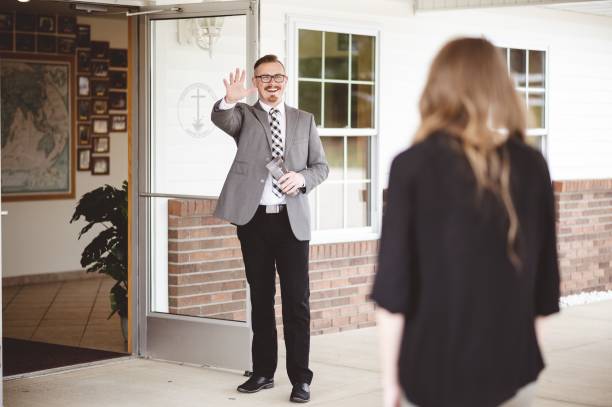“…fulfill your ministry” (2 Timothy 4:5).
That morning as I had breakfast in the hotel dining room, a tall blonde lady entered the room and called out, “Good morning, everyone.” I figured she had to be the hotel manager.
She was.
Terri told me later–as I sketched her–she had been on the job just two weeks. “Before, I managed a hotel in Opelika,” a few miles down the interstate. I complimented her on the way she greeted people. And I told her something.
I work with pastors. And I end up reminding some that they are the manager of this enterprise. They are the chief greeter. The mood-setter.
The pastor is the actual worship leader. No matter who else wears that title.
A word to the pastors among us….
You have a unique opportunity as the undershepherd of the Lord’s flock. You are the overseer (See Acts 20:28 and I Peter 5:2-3).
This means you are in charge.
Get out there and greet people. Be confident. You are the daddy in the room. Act like it. Make sure needs are being met, that your staff is on the job and carrying out their assignments, and that visitors are greeted and assisted in finding their way.
I am not suggesting you act like a boss, but rather, that you show yourself as the chief servant, here to bless everyone, make sure each person is feeling a welcome in the house of the Lord, and seeing to any questions or difficulties.
A visiting evangelist pointed something out to me.
We were having a pizza gathering for the youth, after which the evangelist would speak.
“Look there,” the preacher said. He was indicating our youth minister.
I had to search to find him. He was in the kitchen, standing around, looking bored, doing nothing. Meanwhile, a hundred teenagers were milling about in the church hall. These were his kids, his assignment. He should have been everywhere greeting them, welcoming them, introducing himself to newcomers.
Instead, he was hiding. (Note: At our encouragement, he soon found another line of work.)
I completely get it that some ministers are introverts. Taking over a room as the host does not come natural to them.
Nevertheless, it’s an essential part of the calling and a huge part of the assignment.
If it’s your meeting, you are in charge. Act like it.
Some years ago, while pastoring my last church, I was given a six weeks’ break to study what other churches around the country were doing. That’s when I saw something I’d been doing wrong.
Wishing to elevate our various ministers before the congregation, I had been involving them all in the worship services. One would do announcements, another the welcome, and others the invocation and benediction.
As a rule, the first time I rose in the service was to preach the sermon.
While visiting other churches and sitting in the congregation as a worshiper, I saw the mistake I was making.
In the great churches, those highly effective in reaching people and involving everyone in worship, the pastor invariably filled the role of the host. He came out early and set the direction for the service, made everyone feel welcome (no one can do this better than he), and prepared us for worship. Later, when he stood up to preach, everyone felt they knew him and quickly connected with the sermon.
The pastor sets the mood for everything that takes place today. And clearly, anyone who does that has the most powerful spot on the program.
Pastors give it away all too easily.
During my church visitation period, twice I saw pastors doing what I’d been doing: involving staffers in all the earlier parts of the service. Later, when the preacher walked to the pulpit to begin the sermon, I had the strange sensation that this person was an intruder. Who is he? Yet, he went right into the message as though everyone knew him.
When I returned home, I told our staff, “You can sit with your families in the service. From time to time, you will have a role to play in the service, but not as a regular thing.”
In truth, they were relieved.
Three questions arise…
One. “My minister of music is entrenched in that position as the one opening the service. How can I make this change without upsetting him?”
Answer: Well, you could let him read this article, then say, “I’d like to experiment with this.” Or, you could simply say, “I’d like to make some changes in the way we do worship,” and involve several people in the discussion. Just make sure one of the things coming out of this session is that you are the worship leader from now on.
What you should not do is ask him for permission. (Never, ever put yourself in the position of asking your team members for permission to do anything.) You’re either the leader or you aren’t. If you are, then lead. If you are not, you have more problems than we can address here.
Two. “How can I learn the most effective way to do this?”
Answer: Go online and watch worship services from a number of great churches. Not all will do this, of course, but take notes on those who do. Or, you can simply ask pastor friends who are effective in serving as hosts in the congregation. Either way, you will experiment until you find the way that works best for you.
Three. “Doesn’t playing the host involve more than what I do at the pulpit?”
Answer: It certainly does. Get out there before the service begins and greet people. Walk up to strangers and introduce yourself. Be the friendliest person in the room. Then, when you speak from the pulpit, those you have greeted will already feel an identification with you.
A few suggestions on how to do this well….
Smile. Smile some more. Be happy. Act like you are glad to see people.
Call people by name if you are able. Ask about them. And be prepared to listen. Often, you will do more ministry in 10 minutes before and after a worship service than you’ll do all week.
Give each one your undivided attention, and do not be looking around to see who else may have entered the room. No one is grading you on how many people you greet before a service. The fact that you are doing this at all elevates you in the eyes of most.
I have pastor friends who believe they should go straight from their study into the pulpit while they’re still on a high from their private time with the Lord. In my opinion, this is a mistake. Far better to spend fifteen minutes prior to the service milling among the congregation, greeting, learning names, listening to stories, and frequently praying with someone in need. Then, when you rise to preach, your congregation is ready to hear anything you have to say.
And one caveat–
In some churches, pastors who mix with the people prior to the service get ambushed by a member with a gripe. The toilet is out of tissue, a teacher was absent today, a staffer did not do something he had promised, etc etc.
There is a way to deal with this if it becomes a problem.
The pastor will have a deacon friend accompany him as he circulates among the membership. Then, when someone tries to ambush the pastor, that deacon steps up. “Charlie! How are you? Hey, could I talk to you a minute?” He literally interrupts that person’s griping and frees the pastor to move along, greeting other people. (Get the right deacon for this and he will make it seem so natural, the individual will never know what just happened.)







